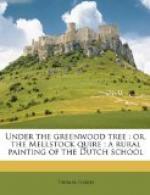“Sinners,” suggested Jimmy, who made large strides like the men, and did not lag behind like the other little boys.
“Miserable dumbledores!”
“Right, William, and so they be—miserable dumbledores!” said the choir with unanimity.
By this time they were crossing to a gate in the direction of the school, which, standing on a slight eminence at the junction of three ways, now rose in unvarying and dark flatness against the sky. The instruments were retuned, and all the band entered the school enclosure, enjoined by old William to keep upon the grass.
“Number seventy-eight,” he softly gave out as they formed round in a semicircle, the boys opening the lanterns to get a clearer light, and directing their rays on the books.
Then passed forth into the quiet night an ancient and time-worn hymn, embodying a quaint Christianity in words orally transmitted from father to son through several generations down to the present characters, who sang them out right earnestly:
“Remember Adam’s fall,
O thou Man:
Remember Adam’s fall
From Heaven to
Hell.
Remember Adam’s fall;
How he hath condemn’d all
In Hell perpetual
There for to dwell.
Remember God’s goodnesse,
O thou Man:
Remember God’s goodnesse,
His promise made.
Remember God’s goodnesse;
He sent His Son sinlesse
Our ails for to redress;
Be not afraid!
In Bethlehem He was born,
O thou Man:
In Bethlehem He was born,
For mankind’s
sake.
In Bethlehem He was born,
Christmas-day i’ the morn:
Our Saviour thought no scorn
Our faults to
take.
Give thanks to God alway,
O thou Man:
Give thanks to God alway
With heart-most
joy.
Give thanks to God alway
On this our joyful day:
Let all men sing and say,
Holy, Holy!”
Having concluded the last note, they listened for a minute or two, but found that no sound issued from the schoolhouse.
“Four breaths, and then, ‘O, what unbounded goodness!’ number fifty-nine,” said William.
This was duly gone through, and no notice whatever seemed to be taken of the performance.
“Good guide us, surely ‘tisn’t a’ empty house, as befell us in the year thirty-nine and forty-three!” said old Dewy.
“Perhaps she’s jist come from some musical city, and sneers at our doings?” the tranter whispered.
“’Od rabbit her!” said Mr. Penny, with an annihilating look at a corner of the school chimney, “I don’t quite stomach her, if this is it. Your plain music well done is as worthy as your other sort done bad, a’ b’lieve, souls; so say I.”
“Four breaths, and then the last,” said the leader authoritatively. “‘Rejoice, ye Tenants of the Earth,’ number sixty-four.”




